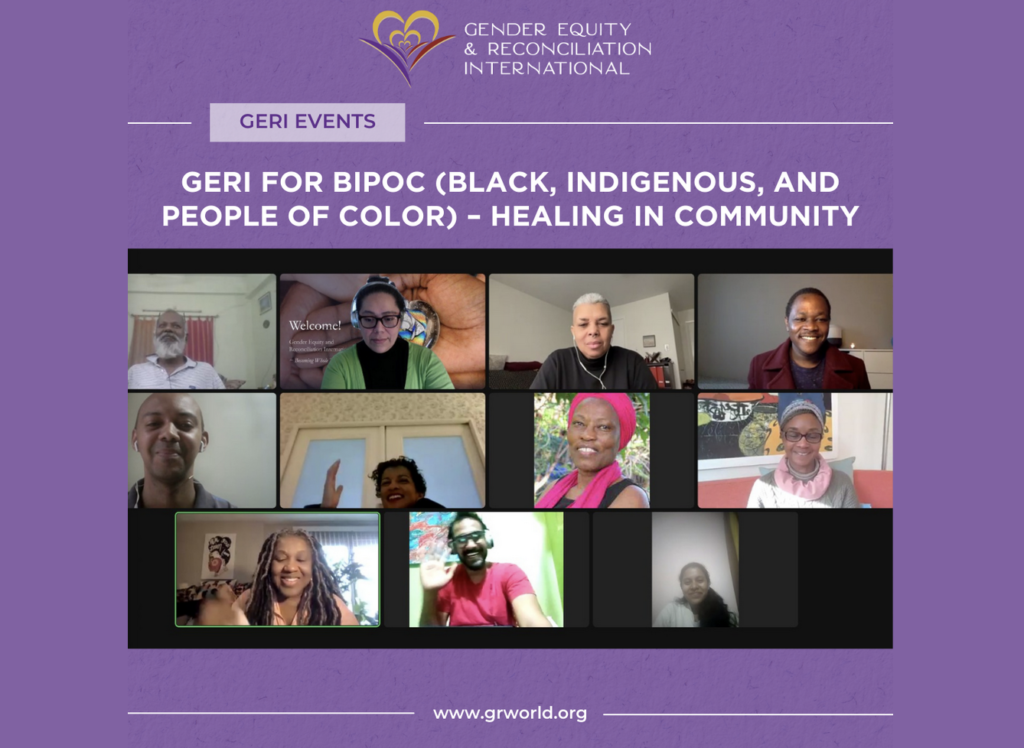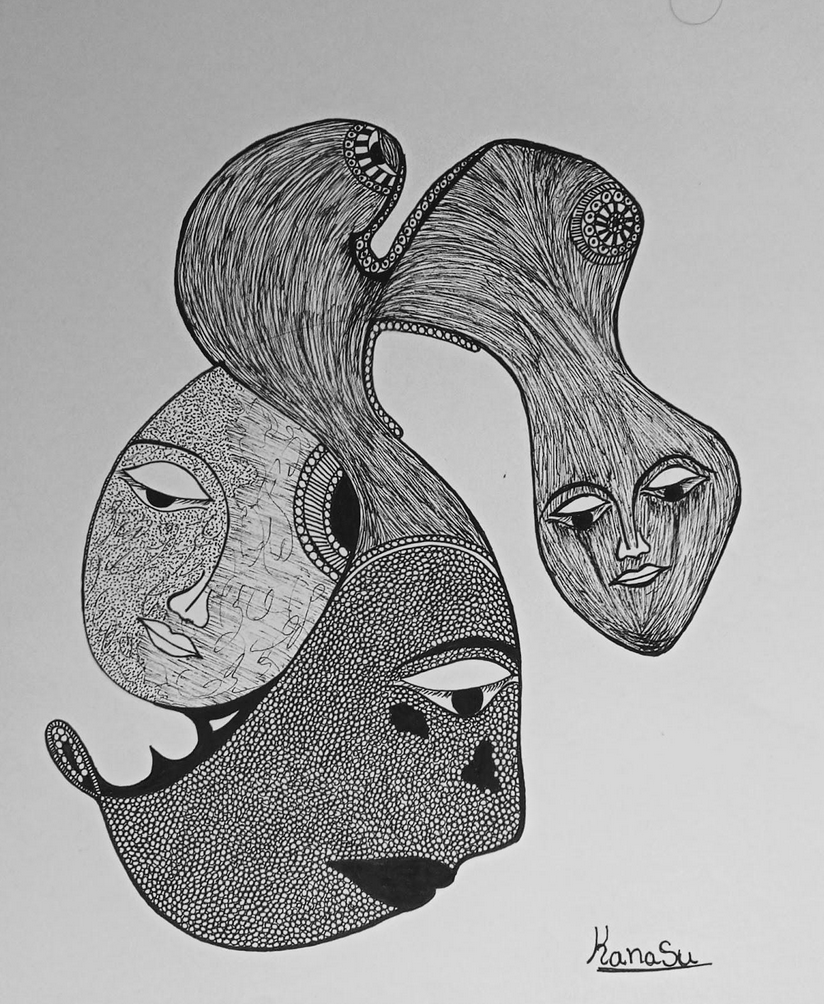“When we entered the space, we did not realize we were holding parts of our stories in our breath until we exhaled.”
(Excerpt from: Gender Equity and Reconciliation – Thirty Years of Healing the Most Ancient Wound in the Human Family – Chapter 11: Intersectionalities and BIPOC Communities)
It is amazing and fulfilling to see where we are today, at the end of 2023, with our GERI BIPOC community. After the first workshop in 2018 and sowing the seeds of GERI BIPOC online in 2022, holding continued BIPOC tasters, information sessions, and introductory programs – the time came in 2023 to reap the fruits of all the preparation work. From late February to April, we launched GERI BIPOC as a full course experience.

GERI BIPOC Lead Myra Kinds writes,
With 13 participants, 7 women and 6 men, we were BIPOC – Black, Indigenous, and People of Color, spanning the globe across Africa, Asia, Europe, and North America. For six weeks, we gathered during the BIPOC workshop, wrestled with our truth, affirmed one another, and tore down the limiting beliefs that divided us, even within our own BIPOC community space. We addressed how as BIPOC individuals we had been conditioned to look and value one another, on not just gender but also our features, birthplace, caste, and the melanin in our skin—to name a few. On and off screen we shared and addressed barriers. In our time together we affirmed our collective narrative of growing up BIPOC, offering and receiving forgiveness. Silence was no longer an option, and no subject was off limits because we’ve lived and understood the damage that silence had already inflicted.
The women’s space:
In the women’s space, the women shared around the historical “mommy versus mammy” mindset. They collectively knew and affirmed how as BIPOC women their existence and sacredness were stolen and defined by patriarchy, colonization, and socioeconomic systems. They shared how their complexion, and bodies still had a silent value system as if they were still being bought and sold as chattel. These women were exhausted; exhausted from needing to be strong and resilient, all the while feeling invisible.

Picture gifted to the women during the honoring ceremony. Drawn by male participant.
Tears flowed week after week as these courageous women reclaimed their identity and voice. As women shared, we heard:
“We have to stop competing with one another, to prove we are somebody.”
“We are enough!”
“We are sacred.”
“I feel really connected when I am here in this place with all of y’all.
Before taking this session, I was really shy, avoiding talk.
I am right now.
I am going up and down,
this is a place, a transformation place.
I am making myself come out of my comfort zone and getting into this space.”
The men’s space:
In our men’s space, we found our men, vulnerable and present to receive the women’s truth. The men shared openly about their own conditioning, wounding, and guilt. We heard and felt their tension of being born male, to being cut off from their ability to express their emotions, unless it was anger. They shared the expectation around taking their place amongst men, and dominance over women and children. They all had painful lessons from the “Man Box.” The Man Box is described by Tony Porter “as the process in which men are socialized, and the dominant culture of manhood, where men are expected to be strong, successful, powerful, dominating, fearless, in control, and emotionless [except anger], while women are viewed as objects, as the property of men, and as having less value than men.” However, as the men spoke from their hearts, the dismantling of the ‘man box’ had begun.
In the opening from one man, remembering a childhood experience, conflicted and saddened, he shared this story:
As a school age boy, he had some awareness that something happened to girls monthly, but it was for the women to handle and to remove themselves clear of the men. However, one day in his youth he noticed a female classmate whose clothing was soiled due to menstruation. He shared that he wanted to cover her, to protect her shame, but could not because this was a women’s issue.
He remembered his conditioning, “Her shame or dignity was not my concern.” He lamented as he recalled this story and simply ended his time sharing, saying, ‘I wanted to help her. I wanted to be her friend, but culture and being a boy made that impossible in that moment.
Men and women honoring
The time of honoring was heartfelt and touched us all. The women expressed their appreciation to the men for showing up and being present to bear witness to their stories, and sharing their journey with struggles.
Men honored the women for their sharing, and created safety for them to share their authentic selves in the space. As an offering, one male participant sketched a drawing, honoring the women. The last voice to close out the forum was a male voice addressing the women, in response to the prompt: what is it that you honor about women, and want them to know? His response:
Looking at each woman, he read her name and simply said, “I Love You.”
And with those words, our time together was sealed.
Deep gratitude to GERI BIPOC and Intersectionalities Lead Myra Kinds for her leadership of this project, and to the facilitation team of this inaugural online course: Evans Njoki, Karambu Ringera, Myra Kinds, Odette Rasgado, and Tristan Johannes.
We’re enthused to continue building this BIPOC program with new tasters, intro sessions, and another immersive online course as we move into 2024.